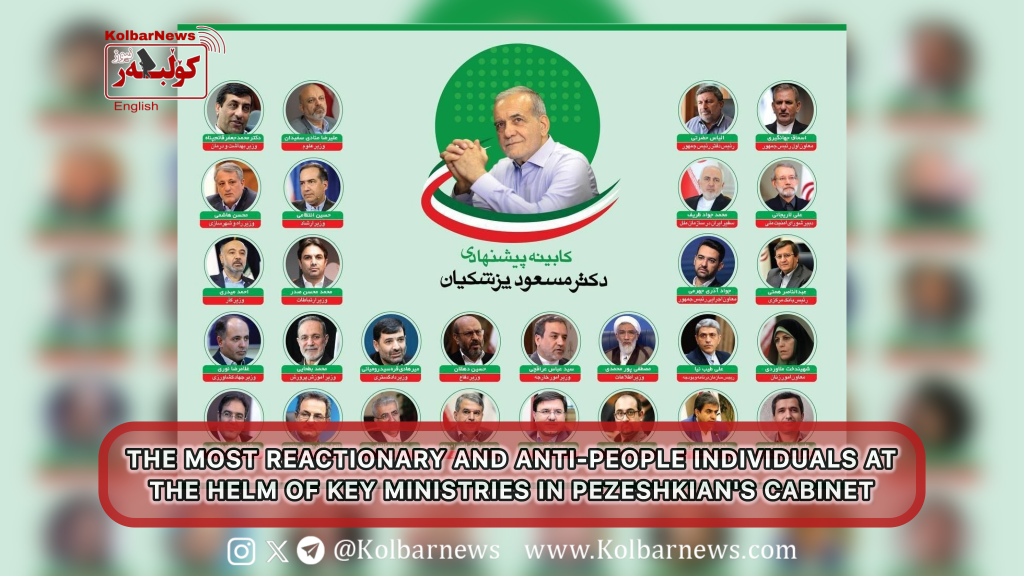
The composition of the cabinet in Masoud Pezeshkian’s government has even drawn criticism from his close allies. Pezeshkian spent three entire weeks gathering nearly 450 “experts” to help him form a supposedly diverse team for selecting his colleagues in the cabinet and fulfilling his campaign promises. However, after all this time and effort, the result was nothing more than satisfying Khamenei’s inner circle and the hard core of power. Now, those who were key figures in his election campaign are expressing regret one by one. For example, “Mohammad Javad Zarif” resigned from his position as Strategic Deputy of the President the night before the list of ministers was presented to the parliament and wrote that there was no longer any room for him to make an impact in the corridors of power. “Mohsen Renani,” a journalist and one of Pezeshkian’s closest allies who actively participated in selecting the names of ministers and deputies as an advisor, when he saw the outcome contrary to what had been discussed with him, wrote in deep disappointment:
“Mr. Pezeshkian, you have tarnished our reputation! You have disappointed our hopes! You failed even before becoming president!” Referring to figures like Amir Kabir, Mossadegh, and Mir Hossein Mousavi, he says: “I wish you knew that in Iran, the only prime ministers who are remembered fondly are those who either slit their wrists in a bathhouse, are exiled to a village to die of sorrow, or have the dust of death sprinkled on their heads in house arrest.”
Of course, what a journalist like Dr. Mohsen Renani laments was already clear to 80% of the Iranian people who boycotted this so-called election. At least since 2017, the majority of the Iranian population has lost any hope of reforming this regime through the ballot box. Those who have failed to grasp this simple truth are the pitiful losers of history.
Pezeshkian, who spoke of the need to restore dignity to Iranian women in order to draw some people to the polls, has kept in place the killers of over 600 people, those who maimed and injured thousands of young girls and boys, and those who imprisoned and tortured tens of thousands of people in less than four months during the “Women, Life, Freedom” revolution. Despite this, there are still so-called opportunistic intellectuals who are giving the public false hope, claiming that perhaps “Pezeshkian’s reading of Nahj al-Balagha” and his breathing on these professional criminals will work miracles. They say, “Don’t judge prematurely, evaluate the cabinet based on its performance, wait and see what happens!”
A review of the names of the ministers Pezeshkian proposed to the parliament shows that he had minimal independence in choosing his cabinet members. In reality, despite the theatrical display of the past month, in selecting his cabinet ministers, he has acted as little more than a secretary carrying out the orders of the Supreme Leader’s office.
Based on the list submitted to parliament, nearly a quarter of Pezeshkian’s proposed ministers were present in Raisi’s government, and the most important ministries have been given to the hardline conservative faction. In fact, nine key cabinet members have been chosen from the list provided by Khamenei’s office. This means that dealing with foreign policy, managing the economic collapse, and handling security, political, and cultural issues are entirely in the hands of the most reactionary part of the regime. In this regard, Pezeshkian’s government has even performed worse than Rouhani’s.
The reformists, who invested everything they had to make the elections appear legitimate, are now left empty-handed and stunned. Mohammad Javad Zarif’s resignation on the day the list of ministers was presented to the parliament and his apology to the people reflect the disillusionment of the reformists and some intellectuals who, in the second round of elections, encouraged people to vote, hoping that the power brokers had accepted a new policy and “openness.” However, the composition of Pezeshkian’s cabinet clearly shows that the core of power has no intention of heeding the people’s demands, continues to insist on repression, and believes that even a single step back could have irreparable consequences. It is predicted that Pezeshkian will face a tragic fate because, on one hand, he has been used by Khamenei’s circle as a temporary tool, and on the other hand, he has tied his fate to that of Khamenei’s establishment, as he has repeatedly said himself, “I am melted in it.” Therefore, he will not escape the flames of the people’s wrath.

